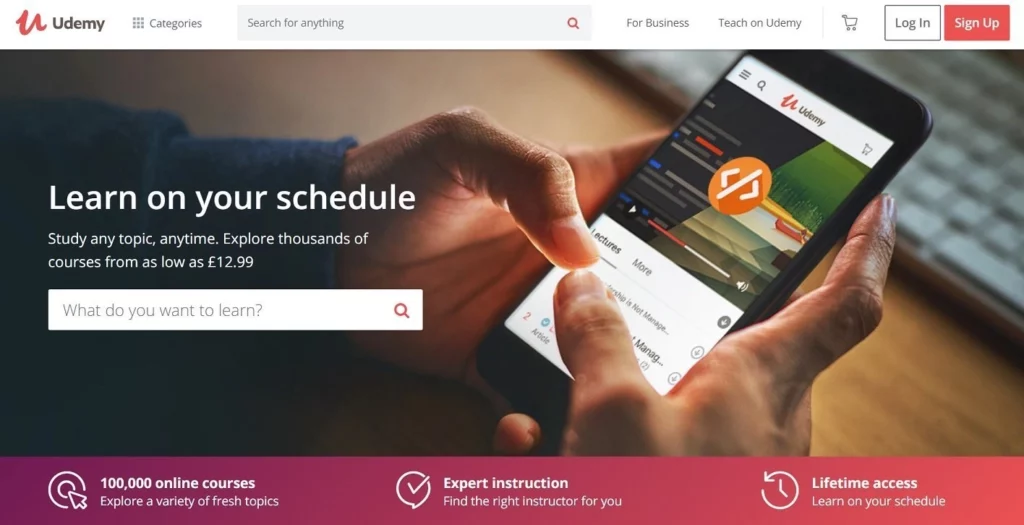In the digital age, the demand for online learning is exploding. More people than ever are turning to the Internet for flexible, accessible education. As a course creator, finding the best way to host an online course can be your key to unlocking this huge opportunity.
Whether you’re a seasoned educator or a passionate amateur, online course hosting platforms offer the tools and technology to create, manage, and deliver your content efficiently. In this guide, we’ll explore some of the top platforms in the industry and compare their features, pricing, and more, to help you find the perfect fit for your course.
Skip ahead:
-
Key considerations for hosting an online course
Top platforms for hosting online courses
Key considerations for hosting an online course
When selecting an online course platform, it’s important to consider several factors. You want to choose a platform that aligns with your goals, needs, and budget. Essential aspects to consider include:
- Features: Does the platform offer comprehensive tools for course creation, student management, and content delivery?
- Pricing: What’s the cost of hosting your course on this platform? Does it provide good value for money?
- Customization options: Can you customize the look and feel of your course to match your branding?
- Scalability: Can the platform accommodate growth as your student base expands?
- User Experience: Is the platform easy to use for both you and your students?
Features
In the world of online course platforms, features are king. You’ll want a platform that offers a comprehensive set of tools geared towards course creation, student management, and content delivery. Ask yourself:, does it have an intuitive course builder? Can it provide insights into student performance and engagement? Does it offer various content delivery options? These features can be the difference between an “’okay”’ course and a truly outstanding one.
Pricing
Naturally, budget plays a crucial role in your decision. When looking at pricing, don’t just consider the dollar amount. Ask yourself whether the platform provides value for the money. Will the platform’s offerings justify the cost in the long run? Are there different plans to cater to your needs as your course gains traction? Remember, cheaper is not always better if it sacrifices functionality and support.
Customization options
Your online course is an extension of your brand, and as such, it should reflect your unique style and ethos. A platform that allows you to customize the look and feel of your course will help provide a cohesive brand experience to your students. Consider whether you can modify course layout, add your branding, or even change the color scheme to match your aesthetic.
Scalability
Growth is the goal for most online course creators. As such, your chosen platform should be able to accommodate an expanding student base. Can it handle a surge in traffic or a rapidly growing number of course enrollments? Does it offer plans that will cater to your needs as you scale? Choosing a scalable platform now will save you the stress and hassle of migrating to a different platform later.
User experience
Finally, both you and your students will be interacting with the platform regularly. As such, the user experience it offers is paramount. Is the platform intuitive and easy to navigate? Will students be able to access and interact with course materials without any headaches? An easy-to-use platform will make your life easier and keep your students happy.
An intuitive, user-friendly interface, robust course management capabilities, and seamless integration with other tools can significantly enhance the learning experience and streamline your workflow.
Top platforms for hosting online courses
Now, let’s dive into our top picks for hosting your online course. We’ll cover the key features and the, pros, and cons of each platform.
Thinkific

When it comes to creating and selling captivating, interactive online courses, Thinkific is a platform that’s hard to beat. Designed to be user-friendly, Thinkific packs a punch with its feature-rich course creation capabilities. Regardless of whether you’re a seasoned course creator or just starting out, you’ll find the platform’s intuitive design remarkably easy to navigate.
Key Features
- A drag-and-drop course builder, giving you a straightforward way to piece together your content.
- Advanced student tracking and analytics, providing you a clear insights into student progress and interaction.
- A customizable course design, allowing you to express your brand’s unique aesthetic and create a personalized learning environment.
- Integrations with marketing tools like Mailchimp and ConvertKit, enabling you to efficiently reach your target audience and optimize your promotional efforts.
Thinkific also shines when it comes to its pricing structure, offering competitive options that cater to various budgets, even including a free tier for beginners. However, if you’re planning to take full advantage of the platform’s advanced features, you may want to consider their higher pricing tiers.
Udemy

Udemy has made a name for itself in the e-learning industry, particularly as a stepping- stone for beginners. This platform operates as a marketplace, meaning your course will join a pool of thousands of other offerings. While the competition may be stiff, the platform’s vast user base offers a considerable opportunity for exposure.
Key Features
- A massive user base, increasing the chances of your course reaching potential students.
- Handy course creation and student engagement tools, aiding in crafting a comprehensive learning experience.
- Udemy handles course marketing, taking a bit of the promotional workload off of your shoulders.
Although hosting your course on Udemy is free, they do retain a significant percentage of your course sales. It’s crucial to consider this cost against the potential benefits of tapping into Udemy’s extensive audience.
YouTube

Though it might seem unconventional, YouTube serves as a viable option for hosting your online course. Its unparalleled user base, user-friendly interface, and the fact that it’s free make it an enticing choice, especially for creators on a budget.
Key Features
- Extensive audience reach, giving your course the chance to gain substantial visibility.
- Simple video upload and editing tools, streamlining the process of getting your content out there.
- The ability to monetize through ads, offering another avenue for revenue.
However, while YouTube is excellent for hosting free or promotional content, it lacks the advanced course management and student engagement features that dedicated course hosting platforms provide.
Wistia/Google Drive

Both Wistia and Google Drive fall outside the category of traditional course hosting platforms. These services provide a space to host your video content, which you can then incorporate into your website or course platform.
Key Features
- High-quality video hosting, ensuring your content is viewed in the best possible light.
- Detailed video analytics with Wistia, giving you a window into viewer behavior.
- Collaboration and sharing features with Google Drive, allowing for efficient teamwork during course creation.
These platforms suit those who desire complete control over their courses and don’t mind taking on the technical aspects. By hosting your video content on Wistia or Google Drive and using a separate platform or your website for course delivery, you could create a unique learning experience tailored to your vision.
How do they compare?
| Platform | Course Creation | Student Management | Marketing Features | Pricing |
| Thinkific | Excellent | Excellent | Good | Starts free, premium plans available |
| Udemy | Good | Fair | Excellent | Free, but takes a commission on sales |
| YouTube | Good (Video Content) | Limited | Excellent | Free |
| Wistia/Google Drive | Good (Video Content) | N/A | N/A | Wistia: Free to start, then subscription. Google Drive: Free |
Choosing the best platform for hosting your online course
Choosing the best platform to host an online course requires a careful analysis of your specific needs and the features offered by each provider. Whether you’re an experienced instructor or embarking on your first online course creation journey, the right platform can elevate your teaching and maximize student learning. Check out our more in-depth guide if you need more info.
Creating an online course is an incredible accomplishment and choosing the right hosting platform is a critical part of that journey. Consider your options, but remember that the tools are only as powerful as the educator wielding them. Your passion, knowledge, and dedication are the true driving forces behind a successful online course.
In the world of online course hosting, Thinkific stands out. Whether you’re ready to take the next step in your online teaching journey, or just curious about what a state-of-the-art platform can do, we encourage you to give Thinkific a try. Embrace the challenge, let your voice be heard, and start shaping minds today. Try Thinkific now!
Conclusion
Finding the best way to host an online course is crucial to your success as a course creator. By comparing the features, pricing, and pros and cons of each platform, you can find a solution that aligns with your vision and goals. Take the first step towards sharing your knowledge with the world by choosing the right platform for your online course today.
FAQs
1. What features should I look for in an online course hosting platform?
Key features to consider when choosing an online course hosting platform include robust course creation tools, student management capabilities, marketing tools, and the ability to integrate with other software.
Look for user-friendly course builders, options for quizzes and interactive elements, analytics to track student progress, marketing features like email or SEO tools, and integrations that allow you to work seamlessly with your existing software.
2. Can I host an online course on my own website?
Yes, it is possible to host an online course on your own website, but it requires a lot more work and technical know-how. You’ll need to handle all the technical aspects of course delivery, including video hosting, payment processing, student data management, and potentially even cybersecurity. While this gives you more control and can save on platform fees, it’s a significant time investment.
3. Are there any transaction fees or revenue sharing involved with online course hosting platforms?
The pricing model depends on the platform. Some platforms charge a flat monthly fee, others take a percentage of your course sales, and some do both. There may also be transaction fees for processing payments. It’s important to fully understand the pricing model of any platform you’re considering, to make sure it fits your business model and budget.





